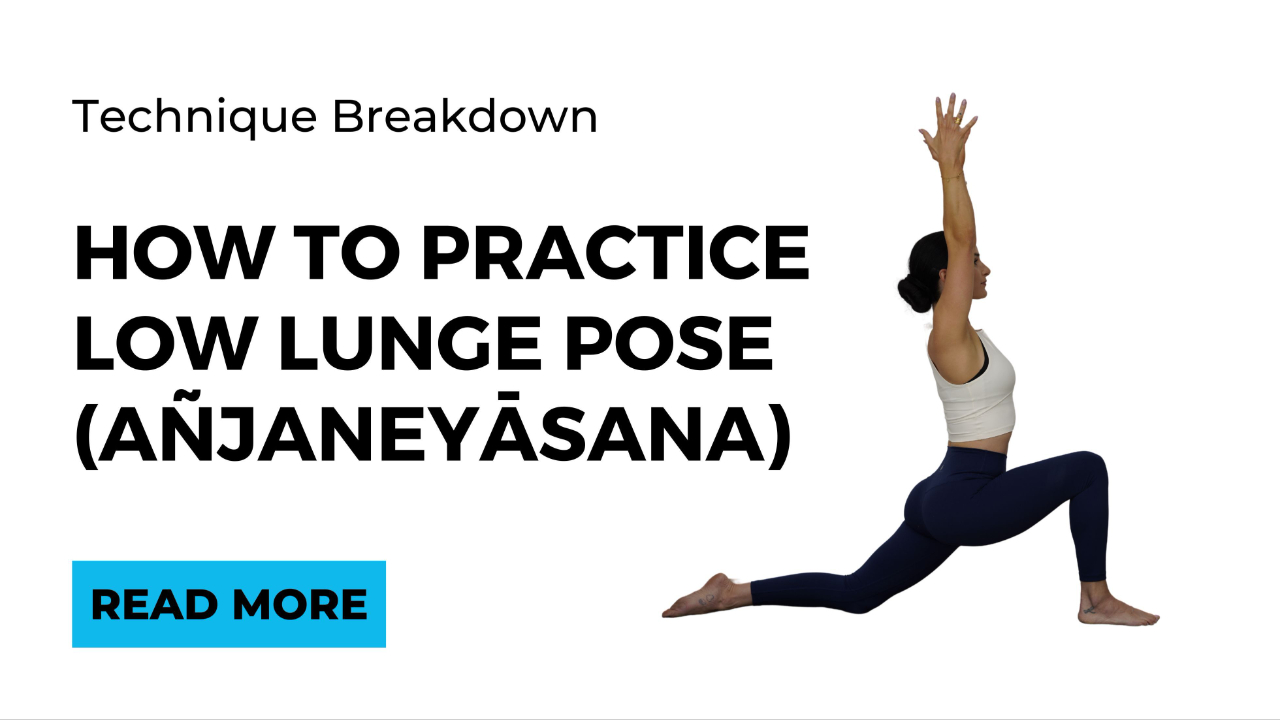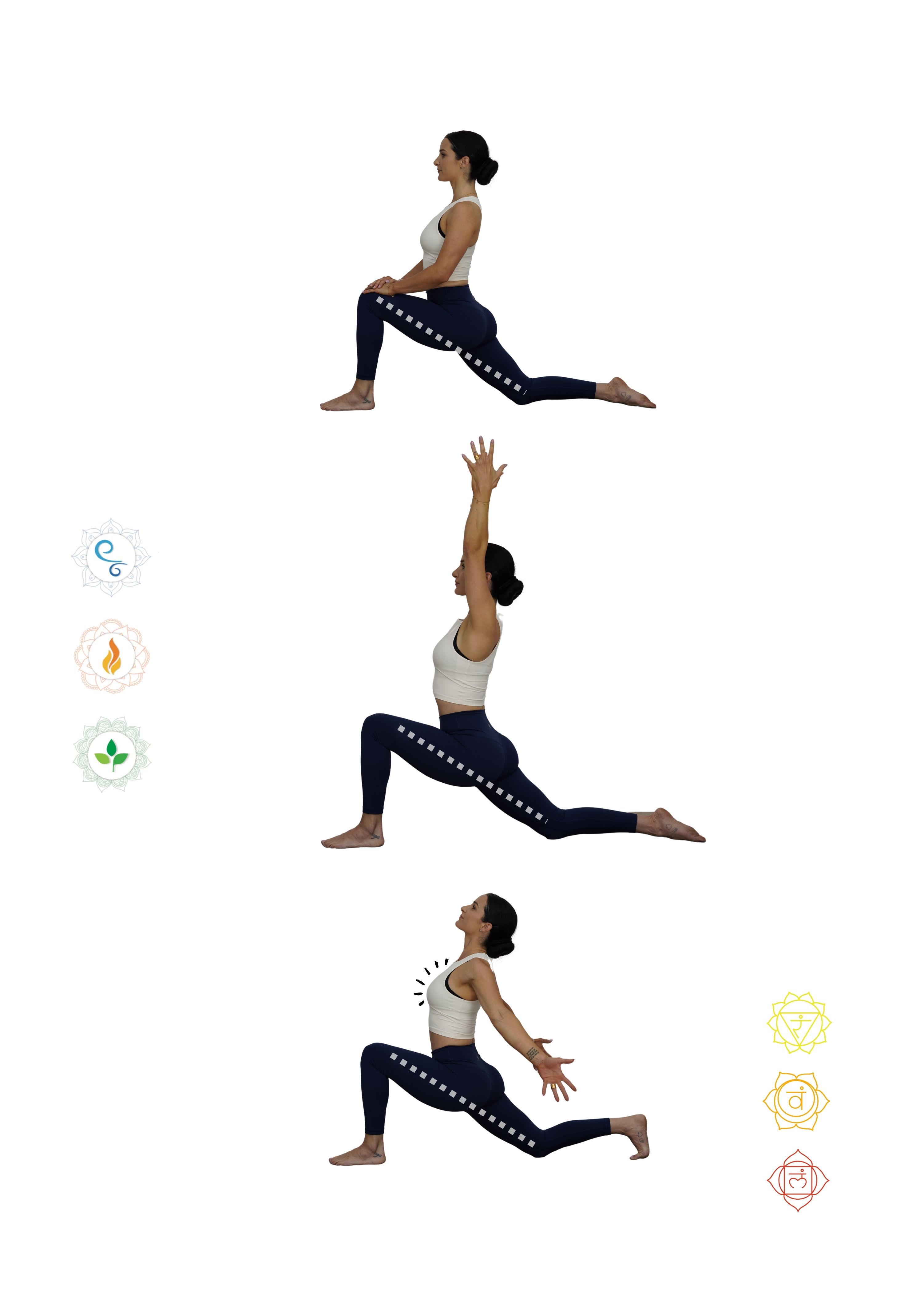How to Practice Low Lunge Pose
May 01, 2025
Añjaneyāsana (अञ्जनेयासन)
- Añjaneya (अञ्जनेय) – a name for the divine being Hanuman, meaning "son of Anjani"
- Āsana (आसन) – posture or seat
Low Lunge, or Anjaneyasana, is a dynamic and accessible posture that builds strength and flexibility throughout the lower body and spine. It’s often used as a foundational shape to open the hips, lengthen the front of the body, and prepare for deeper lunge or split variations. Named after the divine/devotee monkey hero Hanuman (the son of Anjanya), this pose combines grounding with uplifting energy, helping practitioners feel both rooted and expansive.
This asana deeply lengthens the hip flexors and quadriceps of the back leg while strengthening the erector spinae, core, shoulders, and arms. The extension through the spine and opening of the chest and diaphragm promote spinal mobility, deeper breathing, and emotional release.
Low Lunge is also known to help counteract the shortening of the hip flexors caused by prolonged sitting and can be calming yet energising when integrated with breath.
Chakras Stimulated
- Muladhara (Root Chakra) – Grounding through the legs and pelvis
- Svadhisthana (Sacral Chakra) – Opening the hips and pelvic region
- Manipura (Solar Plexus Chakra) – Expanding the core and chest, building confidence and inner power
Doshas Balanced
- Vata – Grounding and stabilising for the nervous system
- Pitta – Opens the chest and diaphragm, allowing for calm, cooling breath
- Kapha – Energising and mobilising, particularly in slower, strength-based holds
Marma Points Engaged
This pose may stimulate Kshipra, Janu, and Basti marma points through the legs and pelvis, supporting pranic flow in the lower body.
Teaching & Practice Tips
- Encourage students to keep the front knee aligned over the ankle to protect the joint.
- Gently guide the hips downward with each exhale to deepen the stretch without force.
- Promote length through the spine before lifting the arms or deepening the backbend.
- For students with difficulty balancing, suggest practicing near a wall or using blocks under the hands.
Modifications
- Place a folded blanket under the back knee for cushioning and support.
- Use blocks under the hands or practice close to a wall for students with balance challenges or limited mobility.
- Students recovering from spine, hip, or knee injury should avoid this posture or consult a professional before practicing.
Variations
- Revolved Low Lunge
- Revolved Low Lunge with Hand on the Floor
- Dragon Pose (a deeper yin variation targeting the hip flexors)
Sequencing Considerations
Use Low Lunge early in practice to open the hips and prepare for deeper hamstring stretches, backbends, or split variations. It transitions well between Sun Salutation flows, standing poses, and seated sequences.
How to Practice (visual and cues):
Low Lunge Suggested Cues:
1. Begin on all fours.
2. Step your right foot forward placing it in between your hands.
3. Keep your left knee on the floor, resting the top of your back foot on the mat.
4. Ensure your left knee is above your ankle.
5. Inhale as you lift your chest and lengthen your spine, creating space in the front of your body. Exhale, soften your hips down toward the floor.
6. If comfortable, raise your arms overhead, reaching up through your fingertips.
7. Relax your shoulders away from your ears and soften your face.
8. Gaze forward and gently lift your chin to open your throat.
9. Hold the pose for several breaths, feeling a stretch through your hips and thighs.
10. To release, exhale as you lower your arms and gently bring your right knee back to the mat.
11. Repeat on the other side, stepping your left foot forward into a low lunge.
Start your Yoga & Ayurveda journey today! Deepen your practice, transform your life, and discover the joy of serving with our Yoga Teacher Training - fully online and self-paced, with live mentoring.

